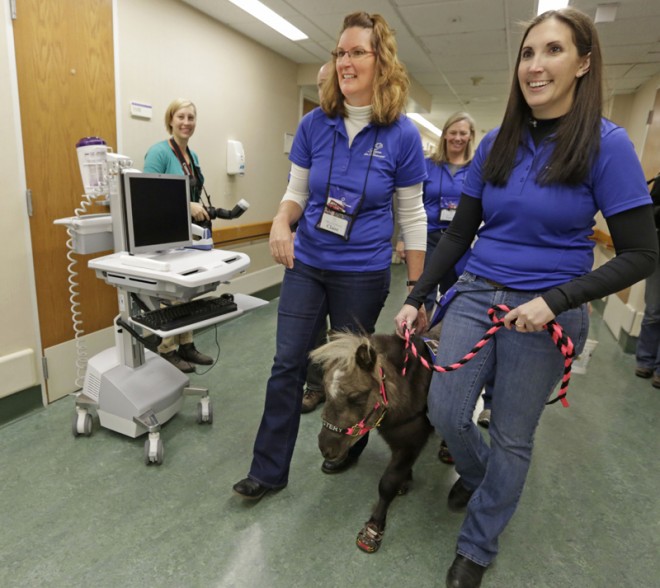Horse trots into hospital: It’s therapy, no joke

In this Nov. 13, 2014 photo, staff and volunteers from ‘Mane in Heaven’ escort Mystery, one of two miniature horses to patients rooms during a visit to the pediatric unit at Rush University Medical Center in Chicago. Mystery and Lunar, small as big dogs, are equines on a medical mission, to offer comfort care and distraction therapy for ailing patients. It is a role often taken on by dogs in health-care settings _ animal therapy, according to studies and anecdotal reports, may benefit health, perhaps even speeding healing and recovery. (AP Photo/M. Spencer Green)
CHICAGO — Two miniature horses trotted into a hospital. Doctors and patients did double-takes when the equine visitors ambled down long corridors in the pediatric unit at Chicago’s Rush University Medical Center.
Wide-eyed youngsters hooked up to IV poles stepped into hallways to get a glimpse, and kids too sick to leave their rooms beamed with delight when the little long-lashed horses showed up for some bedside nuzzling.
Mystery and Lunar, small as big dogs, are equines on a medical mission to offer comfort care and distraction therapy for ailing patients. It is a role often taken on by dogs in health care settings — animal therapy, according to studies and anecdotal reports, may benefit health, perhaps even speeding healing and recovery.
Mini-horses add an extra element of delight — many kids don’t know they exist outside of fairy tales.
“I want one,” said 14-year-old Elizabeth Duncan, stroking Mystery’s nose from her propped-up hospital bed.
Article continues after this advertisementThese horses and two others belong to the animal-assisted therapy group Mane in Heaven. They have visited nursing homes and centers for the disabled, but this November visit was their first-ever inside a hospital. It was also the first horse-therapy visit for Rush, and more are planned.
Article continues after this advertisement“We have long had animal-assisted therapy here at Rush and just seen the enormous benefits that animals can have on most children — just the joy that they bring, the unconditional love,” said Robyn Hart, the hospital’s director of child life services.
Mini horses “are something that most people whether kids or adults have never seen before, and so that builds in a little more excitement and anticipation. They almost look like mythical animals, like they should have wings on,” Hart said.
Some people confuse these horses with better-known Shetland ponies, but minis are less stout, with a more horse-like build. The therapy they offer contrasts starkly with the austere high-tech hospital environment — soft ears to scratch, fluffy manes to caress, big soulful eyes to stare deeply into.
“They’re so nice and they don’t judge and they’re so sweet,” said epilepsy patient Emily Pietsch, 17, after gently tracing Lunar’s heart-shaped muzzle with her fingers.
Mane in Heaven’s owner, Jodie Diegel, a former obstetrics nurse, says the minis bring “smiles, joy, love and laughter and that’s the true healing in action.”
Some research has suggested that animal-assisted therapy may reduce pain and blood pressure, and decrease fear and stress in hospitalized children. But much of it is based on patients’ reports.
A review of 10 years of studies about in-patient therapy using dogs, published in April in the Southern Medical Association’s journal, concluded that it’s safe and can be effective. Dr. Caroline Burton of Mayo Clinic in Florida, a co-author of the review, owns seven dogs, four regular horses and a donkey, and strongly supports animal-assisted therapy.
Burton acknowledged that skeptics dismiss it as “touchy-feely” and lacking hard evidence of any meaningful medical benefits. She said studies are needed on whether animals in hospitals can shorten patients’ stays and reduce readmission rates — something her hospital is looking into with dogs and heart failure patients.
While some worry about animals bringing germs into hospitals, Burton’s review found no associated infections in patients.